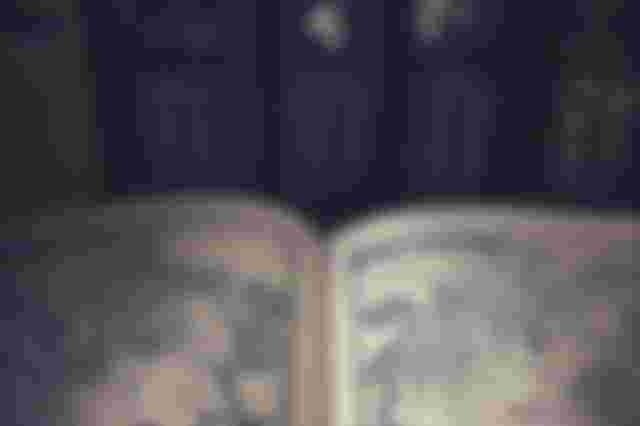A Song of Ice and Fire - Game of Thrones: Books, TV series & Quotes
Nothing created for TV today would have such an impact as the classics from the 1950s to the 1970s. But one should never say never. Of course there might turn up occasional exceptions. A more contemporary series that has got more attention and has more enthusiastic fans than anything else in our time is Game of Thrones. I did read George R. R. Martin's books (collectively known as “A Song of Ice and Fire”) as they were released, and I liked them. I would even call his series a masterpiece in its genre (even if it is not yet concluded). I never really bothered with the TV series, however, because a movie or a TV series based on a book is almost invariably disappointing for those who liked the book. Film is a completely different medium; despite the added visual dimension, it's considerably poorer.
Moreover, I don't like getting a story in small servings over weeks and years. That goes for books as well as a TV-series. I often wait until the whole series is available, if I know when I start that it is to become a series, and then I read the books or watch the series at one time. The TV-series is now concluded. Recently I watched it, all the eight seasons, and I was surprised. It is not as good as the books, but still a very well done interpretation. Perhaps it is the only really good mature fantasy film that has been made, technically as well as artistically. It was an excellent idea to make it a long TV series rather than one or a few movies. I don't know how these very long novels and the many intertwined plots could otherwise be caught on film at all.
Game of Thrones is good fantasy because it uses the attributes of fantasy sparingly. Not too many magic and supernatural phenomena, at least not in the beginning. It increases as the series goes on. But even when it occurs, it is very well done. It feels realistic in that world. Yet the story is mainly a sort of alternative medieval history, in many instances extremely realistic. It has been criticised for its explicit exposure of sex and violence, yet that adds to the realism. It is quite in line with the cultural environment.
Another thing that adds to the greatness of this series, and that goes for both TV series and books, is that people feel very real. Nobody is only good or bad, there is no undefeatable hero who always wins in the end, nobody is always right or wrong – they are real humans, full of contradictions, and they are displayed in that way. With a little imagination, it is easy to understand why they are as they are. Everyone acts from his or her own perspective and as a result of his or her individual past. It is not only thirst for power and madness driving people; it is also simple things as inferiority complex and revenge – very fundamental human experiences and driving forces. Game of Thrones does not describe an ideal world, but a very realistic world – despite the integrated elements of fantasy. It is a realistic display of various manifestations of human nature – and human nature is not better than that.
There are very clear similarities with real history. George R. R. Martin has himself spoken about being inspired by the War of the Roses in Medieval England, as well as by Ancient Rome and Renaissance Italy. Westeros reminds of England and the Seven Kingdoms of Westeros echoes the Heptarchy, the seven Anglo-Saxon kingdoms that preceded the kingdom of England.
To add something negative about the TV-series: the last seasons the story becomes weaker. The series had not only caught up with the books, but passed them by. That means that the story had not (yet) been written as a novel or novels, but has been pushed ahead for the sake of the series. Even if this has been made in co-operation with George R. R. Martin, story and characters feel considerably thinner and more superficial. If the novels had been written first, I'm sure the end seasons had been up to the standard of the first five or so seasons. But it is not so; unfortunately that reduces my overall appreciation of this series considerably.
The novels are richer than the TV series, and George R. R. Martin is an excellent author. Reading these novels is pure delight, despite their massive volume.
Since I know that many readers here like quotes (just as I do), let's look at a few quotes from this literary masterpiece. Note that they are all taken from “A Song of Ice and Fire” by George R. R. Martin.

“Can a man still be brave, if he's afraid?
That is the only time a man can be brave.”
“... and a mind needs books as a sword needs a whetstone, if it is to keep its edge.”
“The heart lies and the head plays tricks with us, but the eyes see true. Look with your eyes. Hear with your ears. Taste with your mouth. Smell with your nose. Feel with your skin. Then comes the thinking, afterward, and in that way knowing the truth.”
“Have you ever considered that too many answers are the same as no answers at all?”
"It all goes back and back, Tyrion thought, to our mothers and fathers and theirs before them. We are puppets dancing on the strings of those who came before us, and one day our own children will take up our strings and dance in our steads."
“Power resides where men believe it resides. No more and no less.”
"When a pirate grows rich enough, they make him a prince.”
Copyright © 2019, 2022 Meleonymica/Mictorrani. All Rights Reserved.
(Image by simisi1/Pixabay, CC0/Public Domain.)
Here you can find my articles about History of Literature.
In my INDEX, you can find all my writings on Read.Cash, sorted by topic.
Selected older articles about literature:
Frankenstein, Religion & Creativity
The Kreutzer Sonata: How Art Inspires to Art, which Inspires to Art...
How I Discovered Science Fiction: A Green Brain & Dune

The world-building behind Westeros is something else. Few authors are able to achieve what Martin has, and that's really saying something.